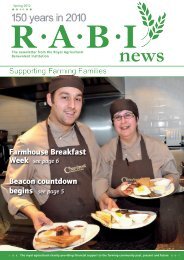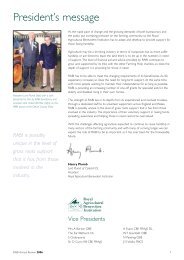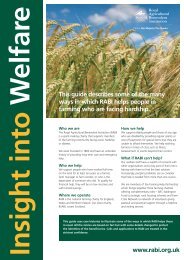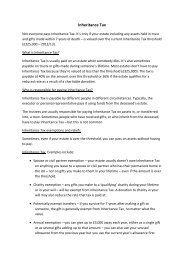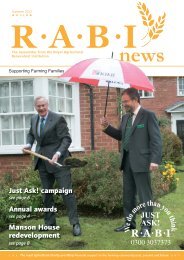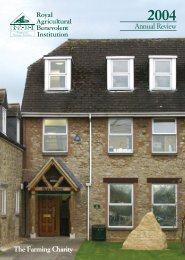The First 150 Years of RABI Part 1 In the build up to our 150th ...
The First 150 Years of RABI Part 1 In the build up to our 150th ...
The First 150 Years of RABI Part 1 In the build up to our 150th ...
Create successful ePaper yourself
Turn your PDF publications into a flip-book with our unique Google optimized e-Paper software.
Pensions ActDavid Lloyd George, <strong>the</strong> chancellor <strong>of</strong> <strong>the</strong> exchequer in Asquith’s Liberal government wasdetermined <strong>to</strong> take action <strong>to</strong> "lift <strong>the</strong> shadow <strong>of</strong> <strong>the</strong> workhouse from <strong>the</strong> homes <strong>of</strong> <strong>the</strong> poor". Hebelieved <strong>the</strong> best way <strong>of</strong> doing this was <strong>to</strong> guarantee an income <strong>to</strong> people who were <strong>to</strong>o old <strong>to</strong> workand in 1908 he introduced <strong>the</strong> Old Age Pensions Act <strong>to</strong> provide between 1s. and 5s. a week <strong>to</strong>people over seventy on incomes not exceeding 12s. a week.<strong>The</strong> council set <strong>up</strong> a sub committee <strong>to</strong> study <strong>the</strong> effect that such a pension scheme might have on<strong>RABI</strong> funds and its pensioners and, as result <strong>of</strong> its deliberations, <strong>the</strong> following statement was madeat <strong>the</strong> AGM in June 1909. “With a view <strong>to</strong> preventing <strong>the</strong>ir funds – which are entirely voluntary –from being used in <strong>the</strong> relief <strong>of</strong> State obligations, <strong>the</strong> Council have resolved that <strong>the</strong> pensions <strong>of</strong>persons who are over 70 years <strong>of</strong> age shall be reduced by such a sum as will enable <strong>the</strong>m <strong>to</strong> applyfor <strong>the</strong> Government Old Age Pension <strong>of</strong> <strong>the</strong> largest amount, provided such a reduction does notinvolve <strong>the</strong>ir Pensioners in any pecuniary loss. Any saving thus effected will enable <strong>the</strong> Council <strong>to</strong>increase <strong>the</strong> number <strong>of</strong> <strong>the</strong>ir annuitants.”However, it was not <strong>to</strong> prove <strong>to</strong> be a straightforward operation as <strong>the</strong> audi<strong>to</strong>rs (Messrs Deloitte)pointed out <strong>to</strong> <strong>the</strong> Oc<strong>to</strong>ber 1909 council meeting. Because, unlike <strong>the</strong> government’s old age pensionscheme, <strong>RABI</strong> did not pay <strong>the</strong> same rate <strong>to</strong> men as <strong>to</strong> women <strong>the</strong> calculations would be different and<strong>the</strong> charity “must entertain <strong>the</strong> keeping <strong>of</strong> an entirely fresh set <strong>of</strong> books and additional <strong>of</strong>fice staff aswell as more lengthy and careful audit <strong>of</strong> <strong>the</strong> accounts.”At <strong>the</strong> same time <strong>the</strong> audi<strong>to</strong>rs estimated that <strong>the</strong> savings should be not less than £1,000 a year “if<strong>the</strong> revision <strong>of</strong> pensions was carried out with care and accuracy.” <strong>In</strong> fact <strong>the</strong> secretary reported <strong>to</strong><strong>the</strong> December meeting that “a saving <strong>of</strong> £1,500 per annum would probably be effected”.Dinner That Never WasAs early as June 1908 <strong>the</strong> <strong>RABI</strong> chairman, <strong>The</strong> Earl <strong>of</strong> Jersey, was approaching <strong>the</strong> Prince <strong>of</strong> Wales <strong>to</strong>seek his consent <strong>to</strong> preside at a Jubilee Dinner in 1910. Not surprisingly, <strong>the</strong> prince was “disinclined<strong>to</strong> make any definite arrangements for an event separated from us by so long an interval <strong>of</strong> time”,and <strong>to</strong>ld him <strong>to</strong> come back nearer <strong>the</strong> time. During 1909 <strong>the</strong>re are indications that some members <strong>of</strong>council were concerned that a date for <strong>the</strong> dinner could not be fixed until <strong>the</strong>y had received aresponse from <strong>the</strong> Prince. This was resolved by his acceptance at <strong>the</strong> beginning <strong>of</strong> 1910 and at <strong>the</strong>council meeting on 2nd May it was reported that “<strong>the</strong> Prince <strong>of</strong> Wales had expressed his personalapproval <strong>of</strong> <strong>the</strong> arrangements made for <strong>the</strong> Jubilee Dinner on <strong>the</strong> 10th inst, and that <strong>the</strong>acceptances <strong>up</strong> <strong>to</strong> date amounted <strong>to</strong> 370”.On 6th May, just f<strong>our</strong> days before <strong>the</strong> dinner, King Edward died. As it is recorded in <strong>the</strong> proceedings<strong>of</strong> <strong>the</strong> 50th annual general meeting on 8th <strong>of</strong> June: “<strong>The</strong> arrangements that had been made forcelebrating <strong>the</strong> jubilee <strong>of</strong> <strong>the</strong> <strong>In</strong>stitution by a public dinner, at which <strong>the</strong> present Kinghad graciously consented <strong>to</strong> preside, were in consequence <strong>of</strong> <strong>the</strong> national affliction immediatelycancelled.” <strong>The</strong> report continues <strong>to</strong> say that <strong>the</strong> jubilee fund, which would remain open until <strong>the</strong> end<strong>of</strong> <strong>the</strong> year had already reached a <strong>to</strong>tal <strong>of</strong> £5,000.



